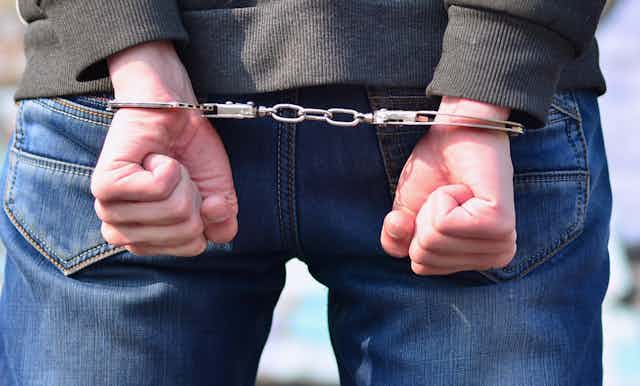Last week, the Queensland parliament voted to override its own human rights law in order to enable children to continue to be detained in police watch houses and adult detention facilities.
This was not the first time it had taken such a step. In March, the parliament passed amendments to override the state’s Human Rights Act to create an offence for children who breach bail conditions, require a sentencing court to consider a child’s bail history, and enable a child to be declared a serious repeat offender.
These moves have attracted a significant amount of criticism because they come so soon after the state’s Human Rights Act was adopted. And they are serious because children’s rights are the ones being trampled – twice – and children are among the most vulnerable members of our community, even when they commit crimes.
What has received less attention, however, is the fact the parliament’s actions also go against international human rights protections under treaties such as the International Covenant on Civil and Political Rights and the Convention on the Rights of the Child.
In addition, overriding the Human Rights Act twice could create a pattern we should be extremely concerned about.
International human rights protections
International conventions broadly obligate parties to make the best interests of children a primary consideration in all actions concerning them. These conventions and applicable international standards also assert that the incarceration of children should be a last resort and juveniles should be treated in an age-appropriate way in criminal justice proceedings.
The Queensland government relied on these specific international human rights protections when it drafted its Human Rights Act, which I have extensively reviewed in my new book (written with Peter Billings).
For instance, section 33 protects children’s rights in the criminal justice process, including a child’s right to be segregated from adults in detention and a convicted child’s right to receive age-appropriate treatment.
In addition, section 32(3) provides that a child charged with a criminal offence has the right to procedures that are age-appropriate and rehabilitation-focused.
Read more: Locking up kids has serious mental health impacts and contributes to further reoffending
These rights recognise that children are entitled to special protection because of their younger age, different needs and relative immaturity. Everyone detained by the government is vulnerable, but children are particularly so.
Although Australia has ratified both international conventions, it has done so with objections. These include giving “responsible authorities” some discretion to decide that segregation of child and adult detainees might not be beneficial if it separates children from their families.
However, this objection does not seem relevant to the recent legislative moves in Queensland because detaining youth offenders alongside adults is unlikely to benefit the children concerned.
Youth offenders and detention
Recent news stories about the alleged criminal offences committed by juveniles in Queensland are immeasurably sad. Yet, in many respects, everyone is on the same page about these issues. No one has said a child who commits a serious crime should not face consequences.
But consequences for youth offenders must take into account their age, intellectual and physical development and disabilities, and potential for rehabilitation.
Even when a child who has committed a serious offence is sentenced to a significant term of imprisonment, the Victorian Supreme Court has noted his or her prospects for rehabilitation are “very much more advanced” by serving the term in youth detention rather than an adult prison.
In other words, youth offenders should not be held in detention facilities with adults. Police watch houses and adult detention centres are not safe places for any young person.
The Youth Advocacy Centre reports that more children are incarcerated in Queensland than in any other state. This is an appalling statistic, especially because many young offenders have themselves been victims of crime, trauma or abuse, were raised in unsafe families or out of home care, or have severe disabilities.
The Queensland government claims the recent legislative moves to override the Human Rights Act will enhance community safety and clarify administrative arrangements for youth detention. However, there is overwhelming evidence that youth detention does not necessarily make communities safer or deter or rehabilitate young offenders. In fact, it may increase the likelihood of reoffending.
Concerning trend of legislative overrides
Rather, these amendments in Queensland are largely serving a political purpose. This is because any move by a parliament to override an established law should only be done in exceptional circumstances, such as a war, state of emergency or crisis threatening public safety, health or order.
In Victoria, the override provision in the Charter of Human Rights and Responsibilities has been used in the past in situations that did not appear to meet the exceptional circumstances threshold. In 2015, a review of the charter recommended the repeal of the override power, calling it unnecessary and unhelpful.
Surprisingly, no such overrides were declared either in Victoria or Queensland – the two states that have human rights laws with this provision – during the COVID-19 public health emergency.
As the Queensland parliament’s actions demonstrate, legal protections for human rights remain frail and subject to the whims of governments or the prevailing moods of their electorates. The Human Rights Act itself is an ordinary law, which means future governments could dilute, amend or even repeal it. (Hopefully, Queenslanders would not stand for this.)
The Act can also be weakened if the parliament overrides its protections too many times. Queensland has now done it twice in six months. This must be taken seriously. Let’s hope we don’t see a pattern of these types of actions – it would make a mockery of human rights protections in Queensland.

